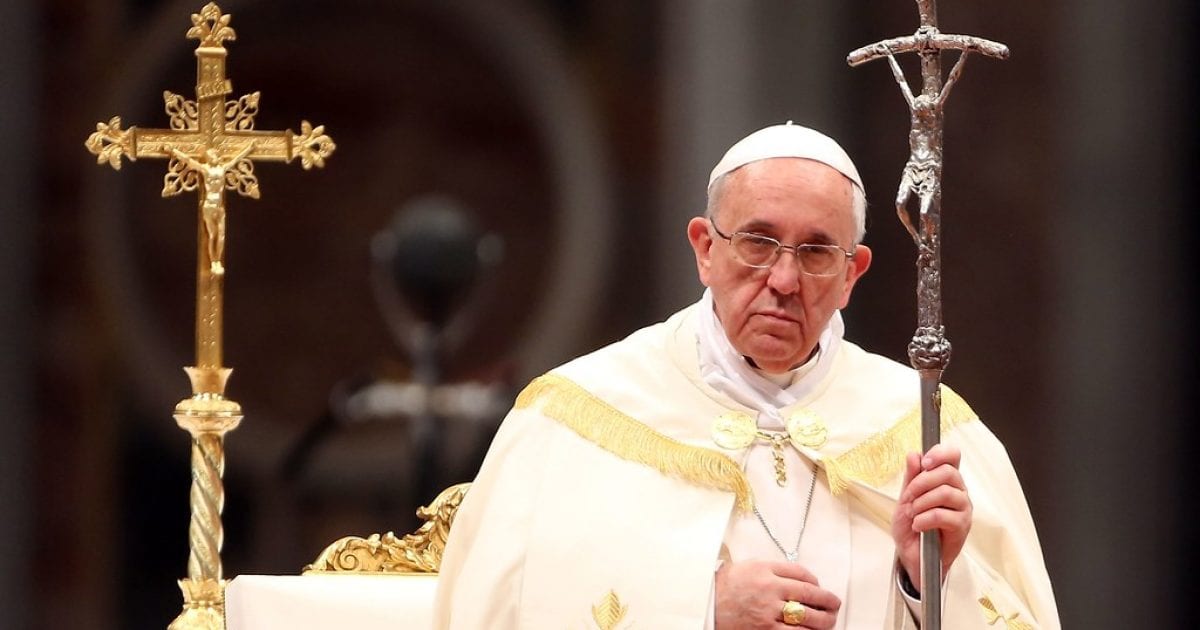Pope Francis’s recent comments on wealth and taxation left many scratching their heads, wondering what the deeper implications would mean.
Calling tax cuts for the wealthy a “structure of sin,” Pope Francis passionately urged for international wealth redistribution.
That’s right: the Pope wants to redistribute wealth across country borders.
Is the pope suggesting we form one world government?
Hmmm…
The pope’s comments seemed tone-deaf and struck many people the wrong way. See some of the responses on Twitter below!
It appears to be a classic case of do as I say but not as I do.
The statements were aimed at the United Nations as he urged them to create a solution that realizes a "legitimate redistribution" of wealth.
This is one of the most economically charged statements made by the pope.
MSNBC has more on the pope's controversial statements:
Pope Francis on Friday called on United Nations leaders to take better care of the poor and advocated for a “legitimate redistribution” of wealth.
“Equitable economic and social progress can only be attained by joining scientific and technical abilities with an unfailing commitment to solidarity” with the poor, the Pope said, in addition to a new spirit of generosity, according to a transcript published by Vatican Radio.
In one of the most economically liberal statements made by any Pope, Francis called for “the legitimate redistribution of economic benefits by the State, as well as indispensable cooperation between the private sector and civil society.”
Francis criticized global wealth inequality and the growing level of poverty and hunger.
“An essential principle of management is the refusal to be satisfied with current results and to press forward,” he said. “Much more needs to be achieved, since an important part of humanity does not share in the benefits of progress and is in fact relegated to the status of second-class citizens.”
While we can all agree that more can be done to help the poor, we should acknowledge that the so-called "wealth gap" appears to be an exaggeration.
Most people live "in the middle." It's not as though there's a huge number of super wealthy people, then a huge number of immensely poor people.
Rather, the majority of citizens globally are neither very rich nor very poor. They're right in the middle.
But wait... there's more.
The pope's comments didn't stop there.
While he didn't specifically name President Donald J. Trump, the pop alluded to tax cuts for the rich, a popular (but false) rallying cry for liberals.
Trump's tax cuts benefit all Americans, of course, but liberals attack the economic stimulus by painting it as a subsidy for the rich.
Specifically, the pop called tax cuts for the rich a "structure of sin."
Breitbart reports on the pope's critique of tax cuts:
Tax cuts for the wealthy constitute a “structure of sin,” Pope Francis said Wednesday in a passionate address calling for international wealth redistribution.
“Every year hundreds of billions of dollars, which should be paid in taxes to fund health care and education, accumulate in tax haven accounts,” the pontiff told participants in a Vatican seminar, “thus impeding the possibility of the dignified and sustained development of all social agents.”
“Today’s structures of sin include repeated tax cuts for the richest people, often justified in the name of investment and development,” Francis told the meeting organized by the Pontifical Academy for Social Sciences.
During his discourse, the pope repeated his conviction that poverty is on the rise worldwide and “the poor increase around us.”
With the passage of time and the advances of civilization the number of poor people increases rather than diminishing, Francis similarly asserted last June, and “the poor are always poorer, and today they are poorer than ever.”
As a Brookings Institution report noted in late 2018, however, the world is currently experiencing “the lowest prevalence of extreme poverty ever recorded in human history — less than 8 percent,” and that number falls with each passing year.
Fortunately, extreme poverty is falling year after year.
This doesn't suggest that the problem is solved, but a free market works to benefit everyone and give people the opportunity to climb the ladder of success.
In free markets such as the United States, extreme poverty has been virtually eliminated, as most people are considered middle class.
Furthermore, "poor" in the U.S. is still considered rich in many areas of the world.



Join the conversation!
Please share your thoughts about this article below. We value your opinions, and would love to see you add to the discussion!